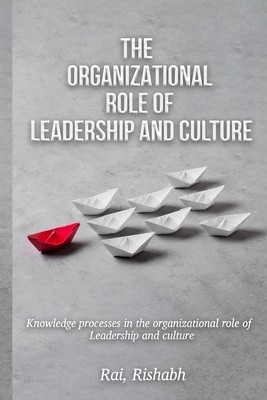
- We will send in 10–14 business days.
- Author: Rai Rishabh
- Publisher: Abrar
- ISBN-10: 1805452665
- ISBN-13: 9781805452669
- Format: 15.2 x 22.9 x 0.7 cm, minkšti viršeliai
- Language: English
- SAVE -10% with code: EXTRA
Knowledge Processes in the Organizational Role of Leadership and Culture (e-book) (used book) | bookbook.eu
Reviews
Description
Knowledge Processes in Organization: Role of Leadership and Culture How the organization should facilitate greater participation of employees in knowledge processes? With this concern, we first postulated that leadership plays important role in enhancing knowledge/learning behavior of employees. Based on data from manufacturing and service sector, we found strong support for leadership influence on learning behavior. However, different leadership approaches adopted different mechanisms to influence learning behavior. Servant leadership focused on creating supportive context that facilitated learning behavior. Moreover, the influence of servant leadership was dependent on the cognitive capacity of employees. The second finding was the role of empowering leadership in motivating employees to pursue learning behavior through cooperation. The third finding was the effect of transformational leadership on learning behavior through interdependence and organizational support as perceived by employees. Moreover, the effect of organizational support on learning behavior was moderated by the cognitive effort of individuals. We conducted another study - qualitative- to examine the perception of Indian managers apropos knowledge behavior from cultural perspective. The qualitative work uncovered the intricacies not assessed/or found in quantitative work. In sum, the work has complemented the quantitative work. The use of cultural perspective has provided a comprehensive understanding of the dynamics and processes involved in knowledge behavior. We have done this by linking processes at micro-level (organization and individual) to macrolevel (national culture). Moreover, this study has conveyed changes occurring in Indian organizations and perception of Indian managers with respect to practices, values and belief system. The third study was a theoretical work wherein we showed how servant leadership influences knowledge creation from the relational perspective by providing several propositions
EXTRA 10 % discount with code: EXTRA
The promotion ends in 22d.05:31:56
The discount code is valid when purchasing from 10 €. Discounts do not stack.
- Author: Rai Rishabh
- Publisher: Abrar
- ISBN-10: 1805452665
- ISBN-13: 9781805452669
- Format: 15.2 x 22.9 x 0.7 cm, minkšti viršeliai
- Language: English English
Knowledge Processes in Organization: Role of Leadership and Culture How the organization should facilitate greater participation of employees in knowledge processes? With this concern, we first postulated that leadership plays important role in enhancing knowledge/learning behavior of employees. Based on data from manufacturing and service sector, we found strong support for leadership influence on learning behavior. However, different leadership approaches adopted different mechanisms to influence learning behavior. Servant leadership focused on creating supportive context that facilitated learning behavior. Moreover, the influence of servant leadership was dependent on the cognitive capacity of employees. The second finding was the role of empowering leadership in motivating employees to pursue learning behavior through cooperation. The third finding was the effect of transformational leadership on learning behavior through interdependence and organizational support as perceived by employees. Moreover, the effect of organizational support on learning behavior was moderated by the cognitive effort of individuals. We conducted another study - qualitative- to examine the perception of Indian managers apropos knowledge behavior from cultural perspective. The qualitative work uncovered the intricacies not assessed/or found in quantitative work. In sum, the work has complemented the quantitative work. The use of cultural perspective has provided a comprehensive understanding of the dynamics and processes involved in knowledge behavior. We have done this by linking processes at micro-level (organization and individual) to macrolevel (national culture). Moreover, this study has conveyed changes occurring in Indian organizations and perception of Indian managers with respect to practices, values and belief system. The third study was a theoretical work wherein we showed how servant leadership influences knowledge creation from the relational perspective by providing several propositions


Reviews